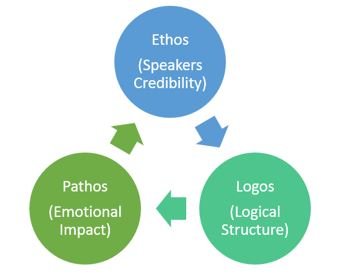The Rhetorical Triangle
The Rhetorical Triangle
Definition: The Rhetorical Triangle is a method - devised by the Greek philosopher Aristotle - to explain how to communicate in the most persuasive manner possible.

The Rhetorical Triangle is based upon communicators expressing themselves by means of three methods: Ethos, Logos and Pathos.
Ethos
Ethos is a derivative of the ancient Greek word Etho, which means habit, character, behaviour. Consequently, Ethos now refers to the character, behaviour and habits of the speaker.
More specifically, it means that effective communicators strive to establish their credibility with audiences, by referring to their past relevant experiences, qualifications and learning.
In practice, it is better to have someone else tell the audience of the fine qualities of the speaker, since, if speakers spend too much time telling audiences how brilliant they are, it can make them sound egotistical.
If speakers want to prove their own authority, then they should put limits on Ethos, and give audiences only sufficient evidence to conclude that the speaker is worthy of respect.
Logos
Logos is the logic that underpins a speaker's content. Logic is the method of reason. If speakers want their audiences to believe their message is true, then they must provide reasons to believe.
There are four ways to present good reasons for your views. By reference to:
- Observed facts, and statistical evidence.
- Appeals to agreed moral and scientific laws.
- Appeals to historical precedent.
- Painful and pleasurable consequences associated to the application or violation of the speakers' conclusions.
By using one or more of these methods, effective speakers give logical justifications for their views.
Pathos
Pathos is the emotional component of messages. Human minds possess strong emotional elements, and Pathos is designed to appeal directly to them.
Effective speakers use colourful language, to spice up their content and to make it more emotionally dramatic, and therefore more interesting and memorable.
Pathos can be added by using:
- Colourful adjectives. "The noble gases are haughty and don't like to mix with the common elements"
- Emotional adjectives. "Climate change activists paint pictures of fearful futures"
- Metaphorical phrases, "The Calvary cut through the enemy lines, like a hot knife through butter"
- Personal discloser, "My favourite Band is Freddie Mercury and Queen,"
Combine Ethos, Logos, and Pathos.
Effective communicators take conscious note of all three elements of communication and build them into their plans. Failure to do so causes failure.
A failure to build ethos causes a lack of credibility which causes the speaker to be ignored.
A failure to build Logos causes a lack of intellectual rigor which causes the speaker to make errors.
A failure to build pathos causes a lack of excitement, which causes the speaker to be boring.
Conclusion.
When considering what you are going to say or write, consciously build in elements of Ethos, Logos and Pathos.
Communication Skills Training.
To learn more about effective communication techniques, please check out our Communication Skills training course.
Definition: Rhetorical Triangle
The rhetorical triangle is a communication model used in business that says every persuasive message must blend credibility (ethos), clear reasoning (logos) and emotional pull (pathos). If you leave out any one of the three parts, the model no longer applies and your message loses power.
Show CG4D Definition
- Contains the three parts ethos, logos and pathos
- Links each part to trust, reason and feeling
- Guides speakers and writers to blend the three parts in one message
- Ceases to apply if any part is missing
Article Summary
The rhetorical triangle shows that every strong message blends credibility, clear reason and vivid feeling; when you balance ethos, logos and pathos, people trust you, believe you and remember what you say.
Frequently Asked Questions
Here are some questions that frequently get asked about this topic during our training sessions.
What is the rhetorical triangle in simple terms?
Why did Aristotle include ethos, logos and pathos?
How can I build ethos when I speak?
What counts as logos in a business presentation?
How do I add pathos without sounding over the top?
What happens if I leave out one part of the triangle?
How do I balance ethos, logos and pathos in an email?
Thought of something that's not been answered?
Did You Know: Key Statistics
LinkedIn Learning's 2024 Workplace Learning Report shows 78% of UK companies rate communication as the top skill to build this year. Gallup's State of the Global Workplace 2024 finds teams with clear manager communication are 3.2 times more engaged than teams with poor communication.Blogs by Email
Do you want to receive an email whenever we post a new blog? The blogs contain article 5-10 minutes long - ideal for reading during your coffee break!
Further Reading in Communication - Persuasive Communication
-
The Rhetorical Triangle
Learn how the rhetorical triangle blends ethos, logos and pathos so you can build credibility, craft logical arguments and spark emotion in every talk or email.
Read Article > -
How to Improve Your Negotiation Skills
Learn ten clear ways to improve negotiation skills: plan ahead, trade not give, set BATNA, stay calm and polite, and write notes to lock in better deals.
Read Article > -
Understanding vs Agreement
Sharpen your communication skills by making sure listeners understand before you seek agreement. Use clear language and solid reasons to avoid costly conflict.
Read Article > -
Effective communication skills
Master effective communication through clear speech, open body language, sound logic and concise writing. Build trust, cut wasted hours and lift your career.
Read Article > -
The Way You Speak to People
Learn how polite speech, positive language and respectful communication draw people to you, lift trust and help you gain cooperation at work and home.
Read Article >
Looking for Communication Skills Training?
If you're looking to develop your Persuasive Communication Skills, you may find this Communication Skills Training Course beneficial:
Open Training Course Pricing and Availability
Next Open Course Starts in 8 days, Leeds City, places available






